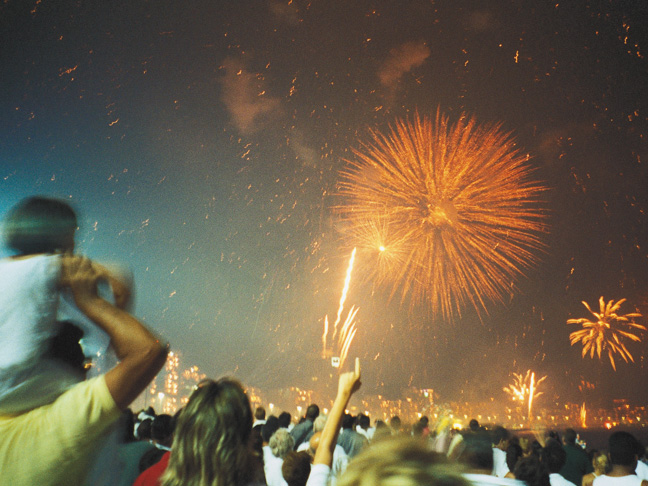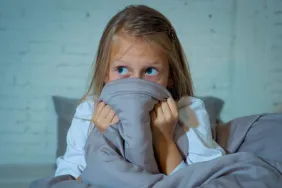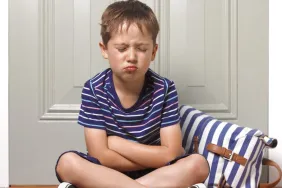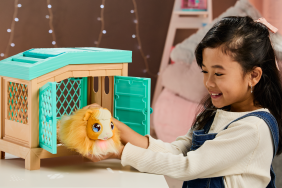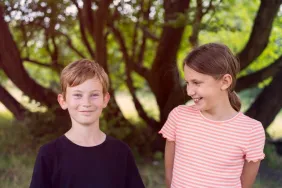I expected my kids to love fireworks, and they do. But there’s a catch. They love them from afar. When we see patterns lighting the sky from the next town over, they drop everything and watch. But our annual fireworks display at the beach? That’s a different story. The sound booms off the water, intensifying it. Although the fireworks are handled by professionals and lit from a very safe distance and only under the best conditions, they sometimes seem as if they might land on us. Inevitably, we end up leaving the party early and watching from inside the house.
Fear of fireworks makes perfect sense, if you stop to think about it. The dark, unexpected loud noises, crowds, and fire are all common fears for young children. Take them out in the dark with hundreds of people to watch fire light the sky while they endure 20 minutes of unexpected loud booms and you can expect at least one child to fall apart. Fears mixed with reality can leave little kids feeling uncomfortable.
While it’s best to avoid pushing kids to “get over it” or somehow conquer their fears for the benefit of the fireworks lovers in the family, there are ways to help kids learn to work through those fears.
1. Let your child know of your plans in advance. Don’t wait until the big day to tell her that tonight is the night for fireworks. Little worriers tend to need help preparing for big events, and last-minute notice might panic them. It’s best to begin to prepare at least one week before the event.
2. Describe how the night will go. Talk about things like how many people you expect to be there, your safety plan for sticking together, where you will likely sit, and how long the fireworks will last. Listen to your child’s concerns. Resist the urge to dismiss his fears and talk through his fears, instead. Empathize with your child.
3. Discuss problem-solving strategies together. Noise canceling headphones keep my kids feeling safe during fireworks and I highly recommend them for all sound sensitive littles. Stock up on flashlights and make sure that your child has her own. Explain the buddy system and let your child pick her buddy for the night.
4. Teach him about fireworks. The fear of the unknown is a powerful fear. Young children have active imaginations and that can sometimes work against them. When you say fireworks, your child might hear giant balls of fire zooming through the sky and potentially landing on the house! Get to your local library and find a book on fireworks. Look at pictures and encourage your child to ask questions about how fireworks work. Get on YouTube and watch fireworks displays from years past. My kids love watching fireworks displays from around the world on New Year’s Eve. This helps them feel a sense of control over the worry. If they see it happening and they hear people cheering and having fun, how scary can it be?
5. Try a practice run. The great thing about the Fourth of July is that people start celebrating in advance. Where I live, the towns stagger the fireworks displays because they are so close together. If you do a little research, you might find that there are some other fireworks shows you can catch in advance, and from the safety of your car (this helps kids feel safe from the fire) to practice before the big night. Bring all of the props you plan to use on the night of your local show (headphones, flashlights, and so on) and keep it short. A quick and easy introduction to fireworks will help your child feel confident and decrease her fears.
6. Create a back-up plan. The truth is that working through fears takes time. You can’t force your kid to enjoy fireworks overnight. If the fear is significant, dragging him into the dark with a huge crowd to watch the fireworks just might be a setup for a meltdown. If practicing and desensitizing seems to help, your child might be ready to give it a try. But, you should prepare to leave early, just in case. Park where you can escape easily. Resist the urge to be right up front and watch from a safe distance, instead. Have plenty of glow sticks and necklaces at home so you can still celebrate.
7. Plan to keep it short. When kids are up late, they are more likely to feel anxious and cranky. The best way to guard your child from a fireworks-related meltdown is to consider her basic needs. Plenty of rest and downtime during the day will help. Bring tons of snacks and remember to stay fed and hydrated. Leave if she shows signs of exhaustion to avoid unnecessary stress for everyone involved.
More Fourth of July Ideas:
- DIY: Fourth of July Paper Sparklers
- Fourth of July Fashion That You’ll Actually Like
- DIY Star Spangled Napkins
Photo: Getty
